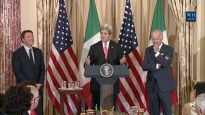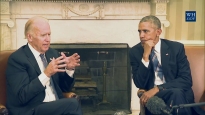President Obama Speaks at the White House Forum on Women and the Economy
April 06, 2012 | 22:15 | Public Domain
President Obama speaks about the women who have shaped his life, and explains why his Administration has worked to consider the needs of women in girls in every decision it makes.
Remarks by the President at the White House Forum on Women and the Economy
South Court Auditorium
10:30 A.M. EDT
THE PRESIDENT: Thank you so much. (Applause.) Thank you, everybody. Everybody, please, please have a seat. (Applause.) Everybody, sit down, sit down. I was going to head over here earlier and they said, no, no, this place is full of women and they’re still settling down. (Laughter.) I said, what do you mean settling down? What are they doing over there? Just creating havoc.
Welcome to the White House, everybody. It is a pleasure to be surrounded by so many talented, accomplished women. It makes me feel right at home. Although usually, I’ve got my wingman Bo with me. (Laughter.)
I want to thank everybody who’s made this Forum on Women and the Economy possible. I thank Mika for helping moderate today and proving that, on your show every morning, that women really are the better half. (Laughter and applause.) Joe is not denying it. (Laughter.) He’s not denying it.
I want to thank the members of my Cabinet and administration who are participating today. And I want to thank all of you who’ve come today lending your time and your energy to the critical cause of broadening opportunity for America’s women.
Right now, no issue is more important than restoring economic security for all our families in the wake of the greatest economic crisis since the Great Depression. And that begins with making sure everyone who wants a job has one. So we welcome today’s news -- (applause) -- we welcome today’s news that our businesses created another 121,000 jobs last month, and the unemployment rate ticked down. Our economy has now created more than 4 million private sector jobs over the past two years, and more than 600,000 in the past three months alone. But it’s clear to every American that there will still be ups and downs along the way, and that we’ve got a lot more work to do.
And that includes addressing challenges that are unique to women’s economic security -- challenges that have been around since long before the recession hit. And that’s why one of the first things I did after taking office was to create a White House Council on Women and Girls. I wanted to make sure that every agency across my administration considers the needs of women and girls in every decision we make. And today, we’re releasing a report on women and the economy that looks at women’s economic security through all stages of life -- from young women furthering their education and beginning their careers, to working women who create jobs and provide for their families, to seniors in retirement or getting ready for retirement.
There’s been a lot of talk about women and women’s issues lately, as there should be. But I do think that the conversation has been oversimplified. Women are not some monolithic bloc. Women are not an interest group. You shouldn’t be treated that way. (Applause.) Women are over half this country and its workforce -- not to mention 80 percent of my household, if you count my mother-in-law. (Laughter.) And I always count my mother-in-law. (Laughter.)
Every decision made by those of us in public life impacts women just as much as men. And this report you all have explains some of what we’ve done to try to lift up the lives of women and girls in this country. But I’d like to spend some time talking about why we’ve done what we’ve done.
For me, at least, it begins with the women who’ve shaped my life. I grew up the son of a single mom who struggled to put herself through school and make ends meet; had to rely on food stamps at one point to get us by. But she earned her education, she made it through with scholarships and hard work, and my sister and I earned our degrees because of her motivation and her support and her impact. I've told this story before -- she used to wake me up before dawn when I was living overseas, making sure that I was keeping up with my American education, and when I'd complain, she’d let loose with "this is no picnic for me either, buster." (Laughter.) And that’s part of the reason why my sister chose to become a teacher.
When my mom needed help with us, my grandmother stepped up. My grandmother had a high school education. My grandfather got to go to college on the G.I. Bill; my grandmother wasn't afforded those same opportunities even though she had worked on an assembly line, a bomber assembly line in World War II. Nevertheless, she got a job at a local bank, and she was smart and tough and disciplined, and she worked hard. And eventually she rose from being a secretary to being vice president at this bank, and I’m convinced she would have been the best president that bank had ever seen, if she had gotten the chance. But at some point she hit the glass ceiling, and for a big chunk of her career, she watched other men that she had trained -- younger men that she had trained -- pass her up that ladder.
And then there is the woman who once advised me at the law firm in Chicago where we met. (Laughter.) Once -- (laughter) -- she gave me very good advice. That's why I decided to marry her. (Laughter.) And once Michelle and I had our girls, she gave it her all to balance raising a family and pursuing a career -- and something that could be very difficult on her, because I was gone a lot.
Once I was in the state legislature, I was teaching, I was practicing law, I'd be traveling -- and we didn't have the luxury for her not to work. And I know when she was with the girls, she’d feel guilty that she wasn’t giving enough time to her work. And when she was at work, she was feeling guilty she wasn’t giving enough time to the girls. And like many of you, we both wished that there were a machine that could let us be in two places at once. And so she had to constantly juggle it, and carried an extraordinary burden for a long period of time.
And then finally, as a father, one of my highlights of every day is asking my daughters about their day, their hopes and their futures. That's what drives me every day when I step into the Oval Office -- thinking about them. Every decision I make is all about making sure they and all our daughters and all our sons grow up in a country that gives them the chance to be anything they set their minds to; a country where more doors are open to them than were open to us.
So when I think about these efforts, when we put together this Council on Women and Girls, this is personal. That’s what is at the heart of all our efforts. These are the experiences, the prism through which I view these efforts. And that’s what we mean when we say that these issues are more than just a matter of policy. And when we talk about these issues that primarily impact women, we’ve got to realize they are not just women’s issues. They are family issues, they are economic issues, they are growth issues, they are issues about American competitiveness. They’re issues that impact all of us.
Now, think about it. When women make less than men for the same work, that hurts families who have to get by with less and businesses who have fewer customers with less to spend. When a job doesn’t offer family leave to care for a new baby or sick leave to care for an ailing parent, that burdens men as well. When an insurance plan denies women coverage because of preexisting conditions, that puts a strain on emergency rooms and drives up costs of care for everybody. When any of our citizens can’t fulfill the potential that they have because of factors that have nothing to do with talent, or character, or work ethic, that diminishes us all. It holds all of us back. And it says something about who we are as Americans.
Right now, women are a growing number of breadwinners in the household. But they’re still earning just 77 cents for every dollar a man does -- even less if you’re an African American or Latina woman. Overall, a woman with a college degree doing the same work as a man will earn hundreds of thousands of dollars less over the course of her career.
So closing this pay gap -- ending pay discrimination -- is about far more than simple fairness. When more women are bringing home the bacon, but bringing home less of it than men who are doing the same work, that weakens families, it weakens communities, it’s tough on our kids, it weakens our entire economy. (Applause.)
Which is why the first bill I signed into law was the Lilly Ledbetter Act -- Fair Pay Act -- (applause) -- to make it easier for women to demand fairness -- equal pay for equal work. We’re pushing for legislation to give women more tools to pay -- to fight pay discrimination. And we’ve encouraged companies to make workplaces more flexible so women don’t have to choose between being a good employee or a good mom.
More women are also choosing to strike out on their own. Today, nearly 30 percent of small business owners are women. Their businesses generate $1.2 trillion last year. But they’re less likely to get the loans that they need to start up, or expand or to hire -- which means they often have to depend on credit cards and the mounting debt that comes with them. And that’s why, through some outstanding work by Karen Mills and the SBA and other parts of our administration, we’ve extended more than 16,000 new loans worth $4.5 billion to women-owned businesses -- (applause) -- not to mention cut taxes for small businesses 17 times, so that more women have the power to create more jobs and more opportunity.
We’re also focusing on making sure more women are prepared to fill the good jobs of today and tomorrow. Over the past decade, women have earned well over half of all the higher education degrees awarded in America. But once they get out of college we still have a lot of ground to cover. Just 3 percent of Fortune 500 CEOs are women. Fewer than 20 percent of the seats in Congress are occupied by women. Is it possible that Congress would get more done if there were more women in Congress? (Laughter and applause.) Is that fair to say, Joe? (Applause.) I think it’s fair to say. That is almost guaranteed. (Laughter.)
And while women account for four in five degrees in areas like education -- which is terrific, because obviously there’s no profession that is more important than teaching -- we also have to recognize that only two in five business degrees go to women; fewer than one in four engineering and computer science degrees go to women. They make up just 25 percent of the workforce in the science and technical fields. No unspoken bias or outdated barrier should ever prevent a girl from considering careers in these fields. When creativity is limited or ingenuity is discouraged, that hurts all of us. It denies America the game-changing products and world-changing discoveries we need to stay on top.
We’ve got to do more to encourage women to join these fields as well -- make it easier to afford the education that's required to make it. Send a clear message to our daughters, which I'm doing every night: Math, science, nothing wrong with it, a lot right with it. We need you to focus. That’s why our education reform, Race to the Top, has put a priority on science and technology and engineering and math education. It has rewarded states that took specific steps to ensure that all students -- especially underrepresented groups like girls -- have the opportunity to get excited about these fields at an early age. And we’ve helped more than 2.3 million more young women afford to pursue higher education with our increases in the Pell grants. That's good news. (Applause.)
Another example -- health reform. It's been in the news lately. (Laughter.) Because of the health reform law that we passed, women finally have more power to make their choices about their health care. (Applause.) Last year, more than 20 million women received expanded access to preventive services like mammograms and cervical cancer screenings at no additional cost. (Applause.) Nearly 2 million women enrolled in Medicare received a 50-percent discount on the medicine that they need. Over 1 million more young women are insured because they can now stay on their parent’s plan. And later this year, women will receive new access to recommended preventive care like domestic violence screening and contraception at no additional cost. (Applause.) And soon, insurance companies will no longer be able to deny coverage based on preexisting conditions like breast cancer, or charge women more just because they’re women. (Applause.)
We don't know -- we haven't gotten on the dry cleaning thing yet, though. I mean, I know that that's still -- (laughter) -- that's still frustrating, I'm sure. (Laughter.)
So when it comes to our efforts on behalf of women and girls, I’m proud of the accomplishments that we can point to. Yes, we’ve got a lot more to do. But there’s no doubt we've made progress. The policies we’ve put in place over the past three years have started to take hold. And what we can’t do now is go back to the policies that got us into so many of the problems that we’ve been dealing with in the first place. That’s what’s at stake.
When people talk about repealing health care reform, they’re not just saying we should stop protecting women with preexisting conditions; they’re also saying we should kick about a million young women off their parent’s health care plans.
When people say we should get rid of Planned Parenthood, they’re not just talking about restricting a woman’s ability to make her own health decision; they’re talking about denying, as a practical matter, the preventive care, like mammograms, that millions of women rely on.
When folks talk about doing away with things like student aid that disproportionately help young women, they’re not thinking about the costs to our future, when millions of young Americans will have trouble affording to go to college.
And when something like the Violence Against Women Act -- a bill Joe Biden authored, a bill that once passed by wide bipartisan margins -- is suddenly called to question, that makes no sense. (Applause.) I don't need to -- that's not something we should still be arguing about. (Applause.)
Now, I don’t need to tell anybody here that progress is hard. Change can come slow. Opportunity and equality don’t come without a fight. And sometimes, you’ve got to keep fighting even after you’ve won some victories. Things don't always move forward. Sometimes they move backward if you're not fighting for them.
But we do know these things are possible. And all of you are proof to that. This incredible collection of accomplished women -- you're proof of change. So is the fact that for the first time in history, young girls across the country can see three women sitting on the bench of the highest court in the land. (Applause.) Or they can read about the extraordinary leadership of a woman who went by the title “Madam Speaker.” (Applause.) Or they can turn on the news and see that one of the most formidable presidential candidates and senators we ever had is now doing as much as anybody to improve America’s standing abroad as one of the best Secretaries of State that we’ve ever known. (Applause.) And they can see that every single day, another 500 women, just like yourselves, take the helm of their own company right here in America, and do their part to grab those doors of opportunity that they walked through and open them just a little bit wider for the next generation.
As long as I've got the privilege of being your President, we’re going to keep working every single day to make sure those doors forever stay open, and widen the circle of opportunity for all our kids.
Thank you for what you do. Keep it up. God bless you. God bless the United States of America. Thank you. (Applause.)
END
10:51 A.M. EDT
|
October 18, 2016
|
October 18, 2016
|
October 18, 2016
|
October 18, 2016
|
|
October 17, 2016
|
October 17, 2016
|
October 17, 2016
|
October 17, 2016
|
- &lsaquo previous
- …
- 13
- 14
- 15
- 16
- 17
- 18
- 19
- 20
- 21
- …
- next &rsaquo







